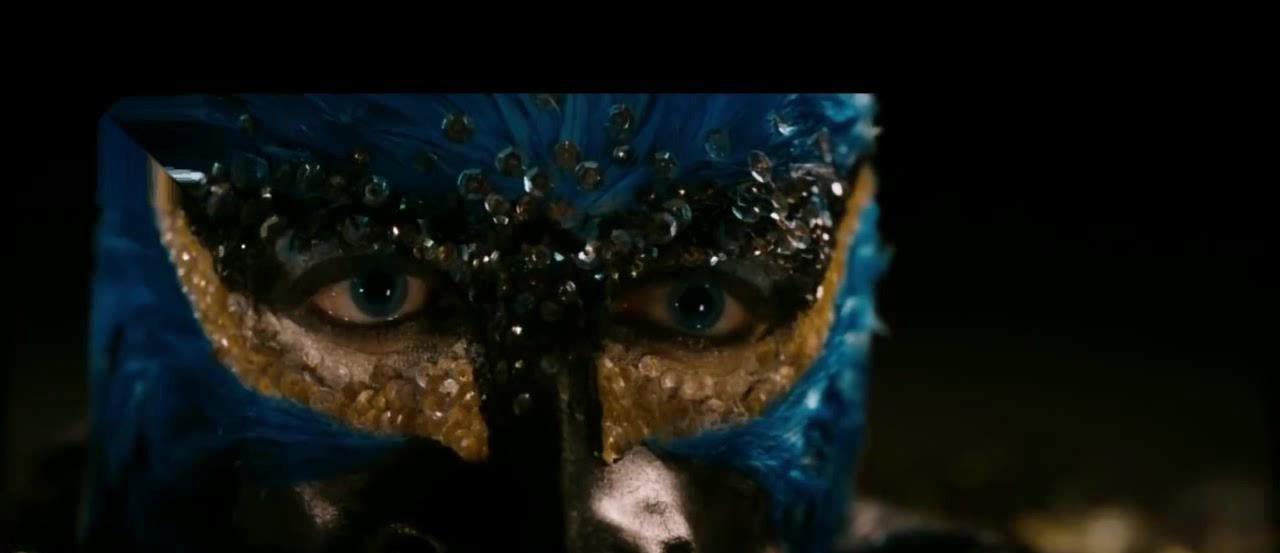Watching the French movie "Goodbye to Heaven" last year, the cruel war, the ugly reality after the war, the absurd story plot left a deep impression on me, the tears left in the blue eyes hiding behind the blue mask seemed to drip into my heart, I was touched by the scene of the father and son reconciling and embracing, but I was heartbroken for Edward to jump from the upper floor.
This year I opened the original novel of this movie, the French writer Pierre Lemet's novel of the same name "Goodbye to Heaven", I thought that after watching the movie, I might get more of a kind of reliving and reminiscing, but when I finished reading it in one breath, I realized that I was wrong, and the experience brought by the original text was more shocking and helpless.

Screenshot of the French film Goodbye in Heaven
<h1 class = "pgc-h-arrow-right" > scars of war</h1>
The scars from the war are most obvious at the body, not to mention the scars left by the wounds that have healed and not healed in various parts of the body, how many people have lost their fingers, palms, arms, legs, feet, eyes, ears... You can imagine, can't imagine, they've all been lost... I remember watching horror movies with my classmates in middle and high school, and the most terrible scene was the appearance of a woman without a chin, which was my nightmare to this day, but I knew it was just a movie, but for Edward, it was his reality. At the end of the war, he lost his jaw forever, and since then he has not been able to eat independently, and can only "put" food into his stomach by injection.
These are "losses", and some of them "get" something that should not belong to the body, how many people have bullets in their bodies, fragments of shells, fragments that cannot be taken out, can only follow them for a lifetime, and may be deadly at any time.
And for them there are many wounds that cannot be seen, which are wounds of the heart, the shadows of war. Albert, for example, although he had survived the war, his soul and mind were like a part left in the soil, imprisoned under it forever. As soon as he left the room, he was extremely uneasy, always sticking his head out before opening the door, looking carefully. When walking, you will also lean your body against the wall, and in any case, you will be on alert. For him, the dead horse that had been buried alive with him was his only solace, and he even needed to soothe his emotions by stroking the horse's head that Edward had given him.
<h1 class="pgc-h-arrow-right" > respect and disgust</h1>
When the war was over, there were shouts of respect for heroes everywhere, and monuments were erected everywhere, but how many of the soldiers who survived were respected? Albert, who returns, is unable to retrieve his beloved fiancée, and while he works as an elevatorman, his fiancée smiles at the gifts he bought for her. If this separation was only Albert's personal encounter, where was the respect that the soldiers deserved when they were discharged from the army, choosing between fifty-two francs and an old, dyed-back uniform?
When people say that "the real hero died on the battlefield long ago", who thinks about the sorrow of the living? Who cares about the suffering of the living? Who understands the hardships of the living?
But even so, do the heroes who have passed away receive the respect they deserve?
No.
You look at the coffin, which is only thirteen inches long, at the dead whose hands and feet were broken, at the corpses that have no names, who are not even of the wrong nationality... In the movie, I don't understand what the inspector saw, but I read this passage in the text to understand the absurdity and sadness.
<h1 class="pgc-h-arrow-right" > father and child</h1>
The story between Perry's father and son is not something that can be expressed in two words, and the film feels more like a wayward child and a father who is not good at expressing fatherly love, and in the book, this conflict is even stronger.
The father in the book is more selfish, he does not know his children, he expects his son to inherit his mantle, but he is angry because of his high and sharp voice, concerned about his dress, behavior with feminine temperament, and Edward's "art" brings trouble that makes him even more unacceptable. Does he love him? Undoubtedly loving, but he loves himself more.
The father in the book undoubtedly genuinely wanted to give his dead child a hug, but before he knew he was alive, Edward had rushed to his car and flew crookedly into the sky with his huge green wings...
If there is a chance to do it all over again, will he tell Edward to become himself, like his father in the movie?
I think it will...
I hope it will...
This is the 33rd book you've read at the beginning
#Reading ##Bookmakers # #阅读的温度 #